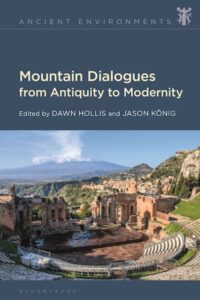 It would be trite indeed for me to write that mountains loom large in human history. Yet at the same time it must be acknowledged that they do play a remarkable role in the myths and histories we have repeated for millennia: Moses receiving the law tablets on Mt. Sinai, Zeus and his court intriguing on Mt. Olympus, Heimdallr standing his long watch on Himinbjörg, and as I learned most recently, Pliny the Elder meeting his mortal end as the result of attempting to get a closer look at the erupting Mt. Vesuvius.
It would be trite indeed for me to write that mountains loom large in human history. Yet at the same time it must be acknowledged that they do play a remarkable role in the myths and histories we have repeated for millennia: Moses receiving the law tablets on Mt. Sinai, Zeus and his court intriguing on Mt. Olympus, Heimdallr standing his long watch on Himinbjörg, and as I learned most recently, Pliny the Elder meeting his mortal end as the result of attempting to get a closer look at the erupting Mt. Vesuvius.
How the ancients perceived and understood mountains, both physically and metaphysically, and how in more recent centuries classically-minded individuals interpreted the writings of these ancients about mountains is the subject of Mountain Dialogues from Antiquity to Modernity, the inaugural volume in the new Ancient Environments series from Bloomsbury.
Bringing together the works of an international collection of classicists, historians, and scholars of languages and literatures under the editorial auspices of Dr. Dawn Hollis and Dr. Jason König, this new book should peak – sorry, pique – the interest of all with a curiosity as to how mountains were used in both the physical and intellectual lives of our ancestors both ancient and modern.
And as my friend Michael will surely be quick to enquire, no, the mountain-themed works of John Tyndall are not cited in this book, which to be honest quite surprised me as those of Thomas Jefferson are. It’s a question I’ll be sure to ask of the editors at the first opportunity I have to do so.
Available from:



